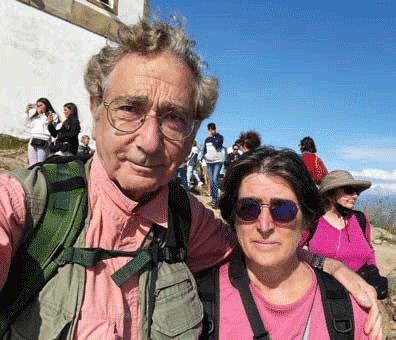
At seven years old, Jay Frogel (PhD ’71) fell in love with astronomy. He would grab his friend, a pair of binoculars, and a telescope and stare at the stars above the Catskills in southern New York. Together, they looked for constellations and marveled at the mysteries of the Milky Way.
“It was fascinating to me,” Frogel says. “I had no idea what it meant to be an astronomer, but I knew I didn’t want to do anything else.”
He fulfilled his childhood dream and more. As an astronomy professor at The Ohio State University, Frogel advanced his field by developing new techniques in infrared astronomy, which studies astronomical objects using their emitted heat energy. He brought distant and older stars and galaxies into greater focus and advanced understanding of the structure, function, and evolution of spiral galaxies, the most common galaxy in the universe. Later, as vice president for science at the Association of Universities for Research in Astronomy, Frogel promoted research and collaboration through the management of world-class observatories and telescopes.
What he remembers most about his career journey is not his hard work or awards but the support he received along the way. First, his parents encouraged his passion by buying him amateur astronomy books and taking him to New York City’s Hayden Planetarium several times a year despite their modest income. Then his roommates stepped in when he struggled with the coursework as a first-generation college student at Harvard University. And when he became a graduate student at Caltech and was unsure of his research focus, professors such as the late Wallace Sargent and Nobel Laureate Kip Thorne, the Richard P. Feynman Professor of Theoretical Physics, Emeritus, guided him to observational astronomy. There he met the late Gerry Neugebauer, one of the founders of the field of infrared astronomy.
Recognizing that no one achieves success alone, Frogel and his wife, astrophysicist Susana Deustua, are helping Caltech undergraduates turn their dreams into reality. The couple has established the Jay A. Frogel and the Susana E. Deustua Scholarship during their lifetime, with an additional estate provision for Caltech designated to the same undergraduate scholarship.
“I received a NASA fellowship at Caltech and was able to devote nearly all of my time at Caltech to doing the research needed for my thesis,” says Frogel, who retired in 2011 and now devotes his time to travel and photography. “I don’t want finances to interfere with students’ learning. I’m happy to make college more affordable for deserving students.”
The scholarship states a preference for female Hispanic students. Deustua, who is Hispanic, has worked in science for three decades and believes the need for more diversity in the field remains just as great.
“The first hurdle in getting more young women to go into physics and astronomy is making sure they can afford college,” Deustua says. “If you really believe in something, then you should support it, and that’s what we’re doing.”


